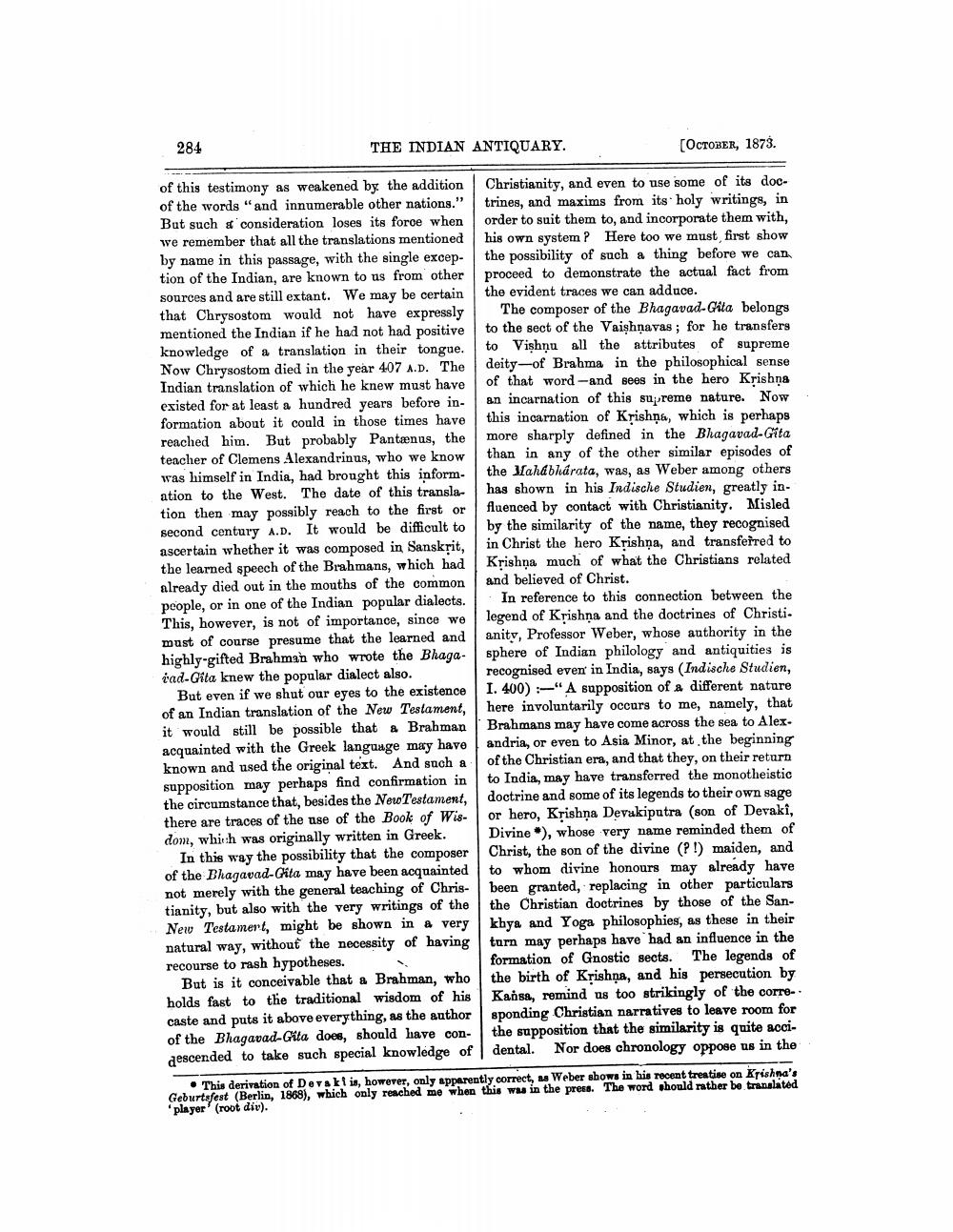________________
284
THE INDIAN ANTIQUARY.
(OCTOBER, 1873.
of this testimony as weakened by the addition of the words "and innumerable other nations." But such & consideration loses its force when we remember that all the translations mentioned by name in this passage, with the single exception of the Indian, are known to us from other sources and are still extant. We may be certain that Chrysostom would not have expressly mentioned the Indian if he had not had positive knowledge of a translation in their tongue. Now Chrysostom died in the year 407 A.D. The Indian translation of which he knew must have existed for at least a hundred years before information about it could in those times have reached him. But probably Pantænus, the teacher of Clemens Alexandrinus, who we know was himself in India, had brought this inform ation to the West. The date of this translation then may possibly reach to the first or second century A.D. It would be difficult to ascertain whether it was composed in Sanskrit, the learned speech of the Brahmans, which had already died out in the mouths of the common people, or in one of the Indian popular dialects. This, however, is not of importance, since we must of course presume that the learned and highly gifted Brahman who wrote the Bhagavad-Gita knew the popular dialect also.
But even if we shut our eyes to the existence of an Indian translation of the New Testament, it would still be possible that & Brahman acquainted with the Greek language may have known and used the original text. And such a supposition may perhaps find confirmation in the circumstance that, besides the New Testament, there are traces of the use of the Book of Wisdom, which was originally written in Greek.
In this way the possibility that the composer of the Bhagavad-Gita may have been acquainted not merely with the general teaching of Christianity, but also with the very writings of the New Testamert, might be shown in a very natural way, without the necessity of having recourse to rash hypotheses.
But is it conceivable that a Brahman, who holds fast to the traditional wisdom of his caste and puts it above everything, as the author of the Bhagavad-Gita does, should have con- descended to take such special knowledge of
Christianity, and even to use some of its doctrines, and maxims from its holy writings, in order to suit them to, and incorporate them with, his own system? Here too we must first show
the possibility of such a thing before we can | proceed to demonstrate the actual fact from the evident traces we can adduce.
The composer of the Bhagavad-Gita belongs to the sect of the Vaishnavas ; for he transfers to Vishnu all the attributes of supreme deity-of Brahma in the philosophical sense of that word -and sees in the hero Krishna an incarnation of this supreme nature. Now this incarnation of Krishna, which is perhaps more sharply defined in the Bhagavad-Gita than in any of the other similar episodes of the Mahabharata, was, as Weber among others has shown in his Indische Studien, greatly influenced by contact with Christianity. Misled by the similarity of the name, they recognised in Christ the hero Krishna, and transferred to Krishna much of what the Christians related and believed of Christ.
In reference to this connection between the legend of Krishna and the doctrines of Christi. anity, Professor Weber, whose authority in the sphere of Indian philology and antiquities is recognised event in India, says (Indische Studien, I. 400) :-"A supposition of a different nature here involuntarily occurs to me, namely, that Brahmans may have come across the sea to Alex. andria, or even to Asia Minor, at the beginning of the Christian era, and that they, on their return to India, may have transferred the monotheistic doctrine and some of its legends to their own sage or hero, Krishna Devakiputra (son of Devaki, Divine), whose very name reminded them of Christ, the son of the divine (?!) maiden, and to whom divine honours may already have been granted, replacing in other particulars the Christian doctrines by those of the Sankhya and Yoga philosophies, as these in their turn may perhaps have had an influence in the formation of Gnostic sects. The legends of the birth of Krishna, and his persecution by Kansa, remind us too strikingly of the corresponding Christian narratives to leave room for the supposition that the similarity is quite accidental. Nor does chronology oppose us in the
• This derivation of Devakt is, however, only apparently correct, Weber shows in his recent treatise on Krishna's Geburtsfest (Berlin, 1868), which only reached me when this was in the press. The word should rather be translated player' (root div).




